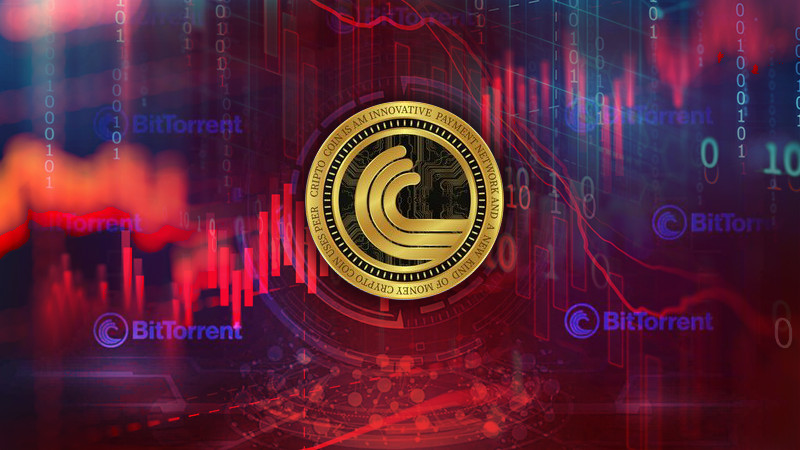
BTTC cryptocurrency (BTT) stands as a prominent TRC-20 token, adhering to the Tron token standard within the blockchain realm. This utility token plays a pivotal role in fortifying the operational framework of numerous decentralized protocols and cutting-edge applications.
Among the array of decentralized applications leveraging BTT, noteworthy platforms include BitTorrent Speed, BitTorrent File System, DLive, and various others currently in the developmental phase. The dynamic ecosystem surrounding BTT continues to evolve, contributing to the ongoing expansion and innovation.
BitTorrent background
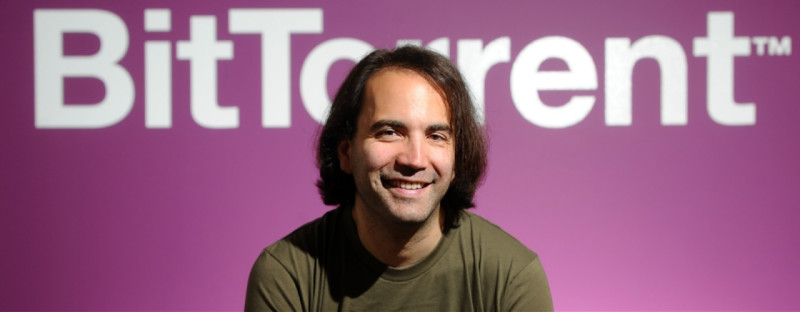
In the year 2000, Bram Cohen, an American programmer, found himself at the Mojo Nation startup—an initially underestimated project that would significantly shape its trajectory.
Within Mojo Nation, Cohen contributed to the development of an encrypted file transfer protocol. The primary objective was ambitious: create a product facilitating the download of files only when documents were being downloaded simultaneously from multiple devices.
Reflecting on his time at Mojo Nation, Cohen acknowledged the invaluable network programming experience he gained. The concept of creating such a product resonated with him, prompting the decision to channel his accumulated expertise into his own venture.
While Cohen recognized the innovative and intriguing nature of the idea, he also admitted that the original developers fell short in crafting an effective and user-friendly service.
In the year 2001, fueled by inspiration, Bram Cohen made the pivotal choice to depart from the Mojo Nation project and embark on the development of his own groundbreaking protocol.

On July 2, 2001, Bram Cohen, the visionary programmer, unveiled the inaugural version of BitTorrent to the public. This revolutionary protocol enabled users to swiftly acquire essential files by simultaneously connecting to multiple devices engaged in transferring the same content.
The product quickly captured the global audience's favor, experiencing unprecedented popularity and demand within a remarkably short period. Seizing the momentum, Cohen, in 2004, co-founded BitTorrent Inc. alongside his brother Ross and business partner Ashwin Naveen.
Despite the project's success, Cohen recognized the need for monetization. The protocol, initially distributed freely, gained widespread usage but faced a significant drawback—its association with the promotion of pirated content.
In an effort to address this challenge, the company launched the BitTorrent Entertainment Network, a movie and music store in 2007. Unfortunately, the implementation of this idea proved unsuccessful, leading to the store's closure a mere year after its inception.
Undeterred, in 2013, the company attempted to re-enter the market by launching a new version of the music store, aiming to compete with industry giants like iTunes and Amazon. Regrettably, this endeavor also met with failure.
Meanwhile, the BitTorrent protocol continued to evolve technically, with the company regularly releasing updates, even introducing paid tariffs. Despite these efforts, profitability remained elusive due to the lack of compelling reasons for users to pay for the service.
By 2005, BitTorrent constituted approximately 35% of all Internet traffic. However, with the rise in internet speeds in 2008, the platform gradually lost its dominance.
Facing challenges in monetization, BitTorrent found a lifeline in 2018 when the Tron Foundation, already known for developing the Tron blockchain, acquired the platform. Justin Sun, the founder and CEO of Tron, purchased BitTorrent and its brand for $140 million.
A year later, the new ownership introduced the native BTT token through an initial coin offering (ICO) as a TRC-10 token on the Tron blockchain, with an initial emission of 990 billion. The cryptocurrency aimed to support protocol expansion and reward network users.
The distribution of the BTTC cryptocurrency occurred not only through ICO but also among the BitTorrent Foundation, Tron Foundation, partners, and through airdrops. This strategic move marked a new chapter in BitTorrent's journey, aligning it with the evolving landscape of blockchain and cryptocurrencies.

The Initial Coin Offering (ICO), involving the sale of a predetermined number of new cryptocurrency units to investors, successfully attracted investments exceeding $7 million for the company.
Investors acquired 17% of the total supply, while 43% of the coins were allocated to the developers and partners of the project, including the BitTorrent Team, BitTorrent Foundation, and Tron Foundation. Additionally, the company earmarked 19.9% of the coins for the development of the ecosystem.
BitTorrent protocol users were granted the privilege to conduct an airdrop of 10%, with a gradual coin distribution planned over the subsequent 6 years following the launch of BTT.
By the close of 2021, the platform transitioned to its proprietary blockchain – BitTorrent Chain (BTTC).
Presently, BitTorrent technology finds application in major platforms such as Facebook, Twitter, Internet Archive, Blizzard, World of Tanks, and Eve Online. Notably, the British government actively utilizes the BitTorrent protocol in its operations. Furthermore, the protocol plays a crucial role in diverse sectors, including scientific research (BOINC), numerous open source projects, and various initiatives in the realm of free software. The widespread adoption attests to the versatility and effectiveness of BitTorrent technology across a spectrum of applications.
Unique features of BitTorrent
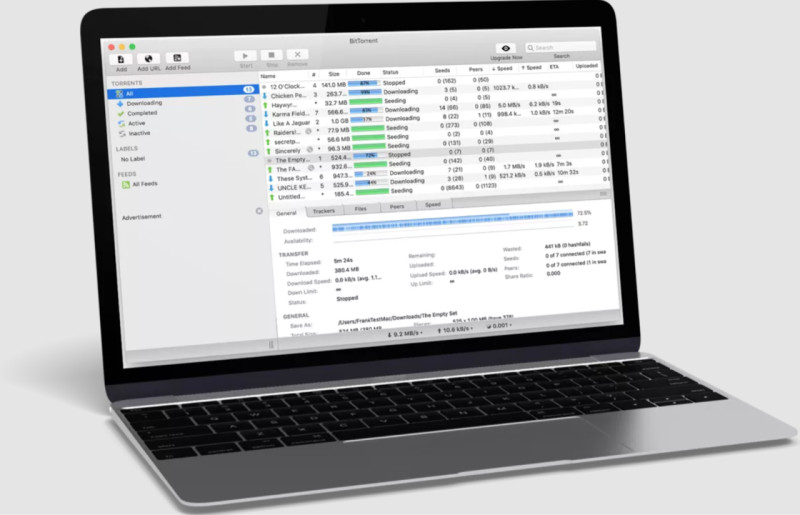
BitTorrent, as a decentralized information transfer protocol, revolutionizes file downloading by allowing users to fetch data concurrently from multiple sources instead of relying on a single service. This distinctive feature results in remarkably high data loading speeds.
The term "BitTorrent" encapsulates a peer-to-peer (P2P) network protocol designed for cooperative file sharing on the Internet. Its appeal lies in being both entirely free and notably effective.
Facilitating the data transfer process is the torrent system, a virtual environment that brings together all participants within this ecosystem. Users follow a torrent link to directly download files, where recipients are referred to as peers, and information transmitters are known as seeds.
To kickstart the process, having at least one seed is crucial. Files are divided into smaller fragments, typically weighing no more than 256 KB each.
Upon downloading even a portion of the file, a peer transforms into a seed, distributing the acquired information. Typically, seeds transmit data to 20 to 40 peers, and for a seamless data transfer process, trackers play a pivotal role.
Trackers, often centralized servers, act as the nexus, uniting all network participants. Should the total number of peers receiving data from seeds drop below 20, a signal is sent to the tracker, which then locates new participants eager to download the data.
The BitTorrent protocol incentivizes user engagement in torrenting. Users who consistently fulfill seed functions elevate their platform rating, granting them the privilege of faster file downloads.
The same principle applies to peers—assuming the role of seeders after receiving data leads to an increased rating, translating to faster download speeds.
However, if data is deleted or downloading halts for any reason, the user's rating diminishes. Such members may encounter challenges in accessing quality download sources from the tracker.
As of the current writing, the BitTorrent service remains free, though various paid versions with enhancements are available online. The enduring popularity of BitTorrent is a testament to its efficiency and user-centric approach in the realm of decentralized file sharing.
Let's explore the primary options for torrent downloading programs:
- BitTorrent Web: Ideal for both Windows and Mac users.
- BitTorrent Classic: Specifically designed for Windows users.
- BitTorrent Android and BitTorrent Remote: Tailored for Android users.
Additionally, there are specific versions within the BitTorrent ecosystem. The first of these is the innovative BitTorrent Speed platform.
In the earlier days of torrent distribution, users sharing content on the network did not receive any rewards, as such incentives were not part of the system. BitTorrent, however, decided to reshape this norm and introduced the BitTorrent Speed feature.
This feature is crafted to reward seeders with BTT coins for their torrent seeding activities. BitTorrent Speed empowers ecosystem participants to use BTT tokens, enhancing the download speed of files they are interested in. Furthermore, users can create a cryptocurrency wallet to store BTT coins and other cryptocurrencies.
Another notable version of BitTorrent is the decentralized platform known as the DLive Protocol. This platform is designed for live broadcasts, fostering direct connections between content creators and their audience.
Participants on this platform can not only host cost-effective broadcasts but also earn BTT coins by watching streams. The earned tokens can be staked to accumulate even more coins. Additionally, during broadcasts, streamers have the option to request and receive donations from their audience.
Getting started with streaming is hassle-free; users do not need to enter passwords or create accounts—simply install the client. Connecting to the network requires no data storage or servers.
Moving forward, the BitTorrent platform introduces BitTorrent File System (BTFS), a decentralized file storage system. Hosts offer storage for BTT coins, and tenants pay a subscription fee in BTT to utilize this storage in their work. Users can access files stored on the BTFS network through the BTFS Gateway.
Presently, the BitTorrent service boasts an extensive user base, with over 45 million people using it daily. This widespread adoption is a testament to BitTorrent's enduring popularity and its ability to cater to the diverse needs of users across the globe.
BTT Token Overview
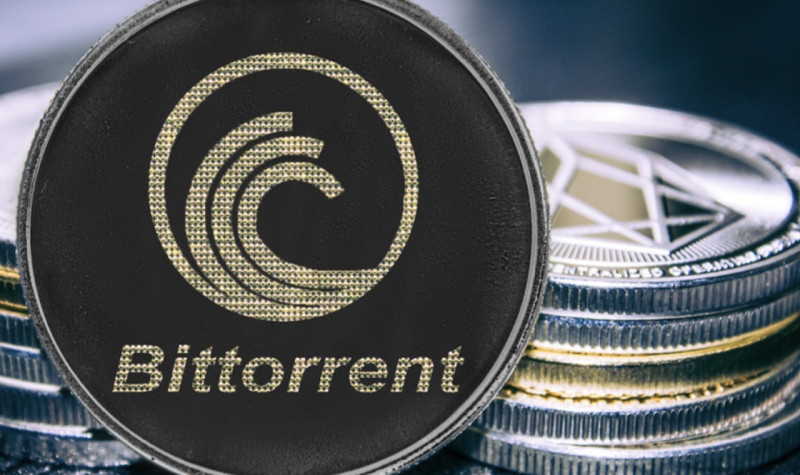
What is BTTC cryptocurrency? Developed by the BitTorrent team, BTTC is an altcoin designed to incentivize users to utilize the BitTorrent protocol while alleviating network congestion.
BTT coins play a crucial role in enhancing download speed and priority. Users can also employ these assets to pay for downloads, enabling them to earn profits for their contributions.
Tron released the token to breathe new life into the platform, addressing the decline of the TRC10 token at that time.
The primary objective of BTTC is to encourage users to continue sharing data even after completing their downloads. Tron aimed to foster support for the platform by providing a modest financial reward for seeding.
During the ICO in 2019, BTT cryptocurrency raised over $7 billion in just 15 minutes, securing a spot in the top 30 cryptocurrencies by market capitalization. In the initial 4.5 months of 2021, the asset surged from $0.00049 to $0.01 but subsequently experienced a significant price decline, nearly tenfold.
The cryptocurrency is compatible with a wide array of decentralized applications and various DeFi ecosystems. The Sun platform offers numerous trading pairs with the BTT token for decentralized exchanges (DEX). Users can utilize BTT for borrowing and staking on the JustLend DAO.
BitTorrent's ecosystem rewards seeders with BTT coins for participating in file sharing. Requesting participants can use BTT tokens to expedite their download speeds.
Users can earn BTT tokens through torrents, streaming content, and staking. Seeders earn BTT through distributions once the file is fully downloaded and shared. Similarly, hosters in the BitTorrent file system can earn coins by providing storage to tenants, and DLive Protocol streamers receive BTT tokens while viewers watch their streams.
Ordinary users can stake BTT to validators in the BitTorrent Chain ecosystem, earning passive income.
Initially used to pay for the services of seeders in the BitTorrent Speed application, the BTTC blockchain launched on December 12, 2021. Subsequently, the updated BTT token, following the TRC-20 standard, was introduced with a total emission of 990 trillion, while the old asset was renamed BTTOLD.
The contemporary iteration of this asset serves two primary functions:
1. Payment of Commissions: BTT coins facilitate the payment of transaction commissions within the BitTorrent Chain network. Users can utilize BTT to cover fees associated with transactions conducted on the network.
2. Staking and Validator Rewards: Operating on the Proof-of-Stake consensus algorithm, the blockchain allows validators to add transaction blocks and receive rewards through staking. It's important to note that while this process occurs in Tron, the underlying blockchain for BTTC, validators within the BitTorrent Chain network are also entitled to rewards.
As part of this system, holders can transfer their BTT to validators, earning a certain percentage of the validator's profit.
It's essential to highlight that BTT cryptocurrency isn't designed for mining; therefore, traditional mining methods are not applicable. Instead, users can earn BTT by serving as a seed in the ecosystem—creating a torrent file and uploading it to the tracker for distribution on the BitTorrent platform. Upon completion of this straightforward process, BTT assets are directly credited to the creator's wallet.
Certain centralized exchanges offer staking rewards for BTT holders who choose to stake their coins for a specified duration.
In terms of market capitalization, BTT stands at $1.09 billion, securing the 82nd position in the CoinGecko rating. Market capitalization is calculated by multiplying the value of BTT coins by the number of coins in circulation. Currently, there are 968.246 trillion tokens in circulation.
As of February 27, 2024, the exchange rate for one BTT coin is $0.00000111 (BTTC/USD).
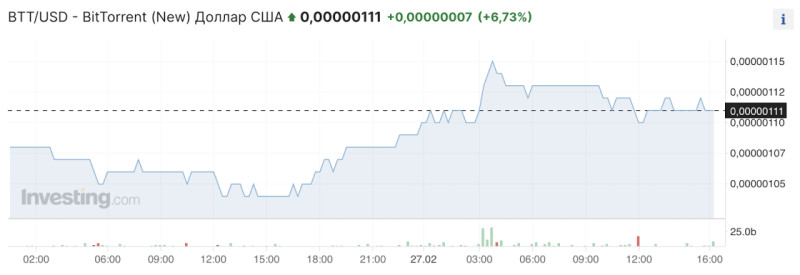
The current BTT price is lower than its ICO price.
Where to buy and store BTT?
BTTC is now traded on almost all centralized exchanges, including Binance, OKX, Bybit and KuCoin. The most popular exchange for buying and trading BitTorrent today is DigiFinex.
Another option would be to purchase an asset on decentralized exchanges, for example, on the Tron blockchain on the SunSwap platform. In the BNB Chain and Ethereum blockchains the purchase can be done on the PancakeSwap and Uniswap platforms, respectively. BTT is traded there using the BTTC Bridge.
The choice of cryptocurrency wallet on which to store an asset will depend on the desired network. For example, the best option on the Tron blockchain would be the TronLink wallet. For the BitTorrent Chain, BNB Smart Chain and Ethereum networks, any EVM-compatible solution, for example, the same MetaMask, is ideal.
Why buy BTT?

Since its inception, the BitTorrent project has proven to be an efficient means of distributing large files across a peer-to-peer network, implementing tit-for-tat strategies to facilitate swift data sharing among participating peers.
Nevertheless, in recent years, the BitTorrent project has experienced a decline in popularity as alternative platforms for data exchange emerged. The current market landscape reflects a diminishing use of torrents for downloading movies, music, and other content, with users predominantly favoring online formats for media consumption.
This shift has resulted in a significant decrease in the number of seeds on the platform, complicating the search for downloadable files, and prompting many once-active users to abandon the platform altogether.
In 2021, the BTT token witnessed a nearly 20-fold increase in price, followed by a 10-fold decrease. While the coin still holds growth potential, the prevailing sentiment among network participants is not overwhelmingly optimistic. Presently, the coin faces a margin of decline, lacking sufficient momentum for confident growth.
However, the token's value could experience a sharp ascent, influenced by major content providers. Should successful companies like Netflix or Blockbuster turn their attention to BitTorrent and opt to distribute their content through it, demand for BTT tokens is likely to surge, as users seek to acquire BTT coins for accessing content from these popular streaming platforms.
Another pivotal factor that could positively impact the value of the BTT asset is potential changes in the protocol itself. Introducing new features and substantially enhancing user services could attract a broader user base, leading to increased demand for the BTT cryptocurrency and a subsequent rise in its value.
Recent developments reveal that the Huobi cryptocurrency exchange has decided to join the BitTorrent ecosystem, aiming to create and enhance an open financial system. This move by Huobi holds promise for expanding the BTTC network's community, especially considering the exchange's vast user base of over 50 million worldwide.
Looking ahead to 2024, the BitTorrent token appears poised for expansion, with the company hinting at various new partnerships and initiatives. Consequently, there's a plausible expectation that the BTTC cryptocurrency could surpass $0.000003. However, prudent investment decisions should be made only after the BTT Relative Strength Index exits the oversold zone.
If the upward trend persists until 2025, the asset could potentially reach $0.000004. Yet, any market pressure could impede the realization of this target.









 Back to articles
Back to articles

